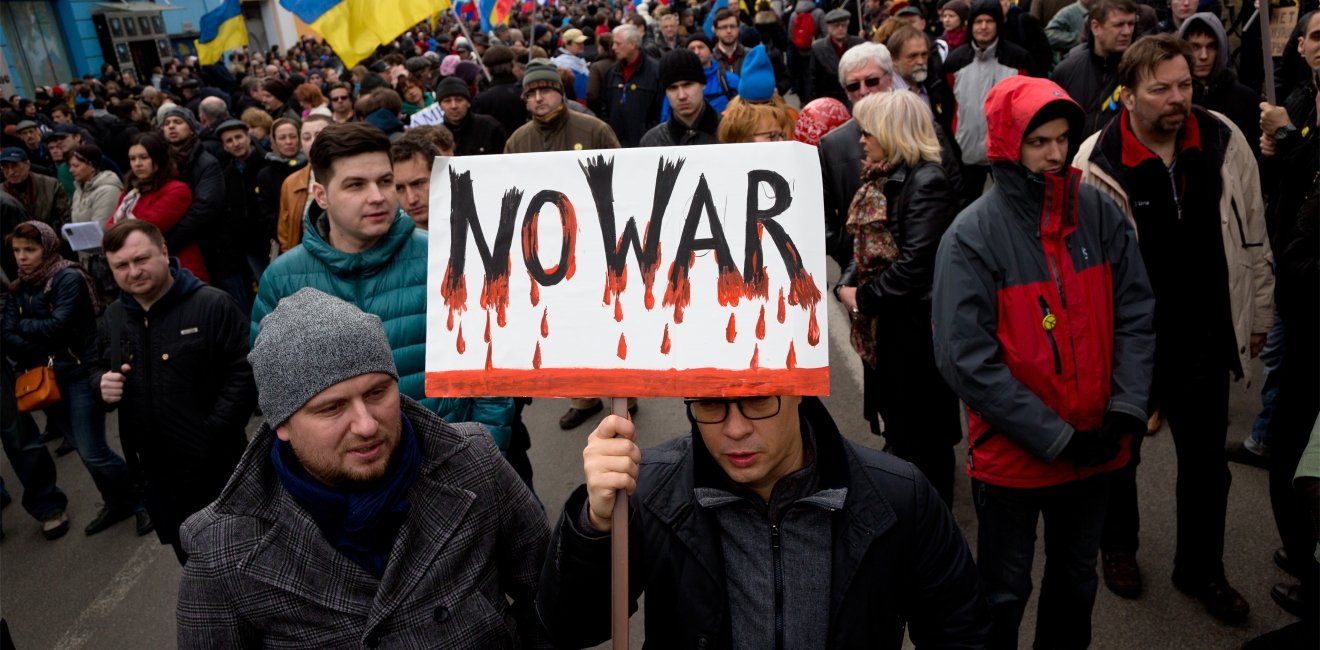
A blog of the Kennan Institute
BY MYKHAILO MINAKOV
In recent months, alarming reports of Russian troops massing on Ukraine’s border and speculation about an impending Russian attack have figured prominently in news analysts’ commentary. However, after the failed talks between the United States, NATO, and Russia on January 10–13, 2022, the level of concern in the statements of politicians, experts, and journalists has noticeably deepened. What is the mood in Ukraine at this time? To learn more, I posed two questions to our experts:
—In your opinion, how likely is it that Russia will attack in the coming weeks?
—How do you assess the readiness of Ukrainian leadership to face and counter an escalation of the conflict with Russia?
The following answers, both emotional and reflective, capture widely shared sentiments in Ukraine today.
Nataliya Gumenyuk, Ukrainian journalist and author specializing in conflict reporting, founder of the Public Interest Journalism Lab, Kyiv
I constantly talk to Western diplomats and experts, Russian independent journalists, Ukrainian politicians, as well as people in eastern Ukraine. Unfortunately, the possibility of an incursion is growing. I think the Kremlin has not yet decided whether to launch a new assault, but it’s a real threat, not a bluff.
The probability of attack is higher than in November. Moscow looks at the reaction of the West, checking whether it’s ready to support Ukraine, and tries to goad the Ukrainian side into action in a moment of extreme anxiety.
I give credit to the Ukrainian government. The administration does everything possible to de-escalate, apart from the fact its Donbas policy for the last two years was aimed at a peaceful resolution. Neither the authorities nor the majority of Ukrainians want full-scale war.
Listening to the Russian politicians, I am becoming more pessimistic. It’s not just about the ultimatum Moscow delivered to NATO; they assert that no important global decisions can be made without Moscow, and that the West should stop talking about corruption, human rights, democracy. —Thus it looks as though the story is about Ukraine, the threat is first of all to Ukraine, but little happens in Ukraine itself. So we can do little apart from seeking international support to be better prepared. By the way, I do not feel Ukraine is neglected by the international community.
The support from the West is there, but Western countries are trapped in a paradox: Russia threatens because it can, because it knows the West won’t respond militarily as the whole idea of the current international order is to avoid war at any cost. For the West, it’s hard to negotiate with somebody who has little to lose, as Moscow cares less about the damage to its domestic economy. The pragmatists in the Kremlin are gone, the military and the FSB are in control. Ukrainians can do little apart from preparing themselves to defend, which is happening.
I know our military leaders are on alert and engaged and looking at different scenarios. So I feel a doomed optimism. The threat is disproportional. Russia is far stronger in military forces, but I also do not see how Russia could invade Ukraine and control the territory in the long run. As for the general population: it’s impossible to keep living in a constant state of hysteria induced by reading the news. “Keep calm and carry on” best explains the current mood here.
Victor Andrusiv, Director, Kyiv School of Public Administration
The Russians have put everything on the line. This means there is very little chance they will step back. I would say the Russians have burned their bridges all by themselves through their absolutely insupportable demands, which left no room for compromise on security in Europe. The demand not to enlarge NATO cannot be fulfilled owing to the statute and founding charter of that organization. By putting forward this demand, then, Russia knew the results in advance. Also, if Moscow retreats now without any achievement to show for its efforts, that would be a sign of weakness, and Russia would no longer be treated as a threat.
All this leads me to the conclusion that military conflict is inevitable.
This situation for Ukraine, as I see it, has positive and negative implications. First of all, we are psychologically prepared for war since we have lived in a quasi- or real wartime situation for seven years already. A new military conflict will not have the same huge shock as it did in 2014.
Second, I observe that Ukrainians are motivated to resist, to protect our country, and to fight the enemy more than ever before. I am sure that if Russia attacks, it will get a serious and hard fight.
However, we did not seriously increase the capacity of our army. We did not learn much from our defeats in 2014–2015. We still have big problems in coordinating the troops in battle operations, our supply logistics are not yet good, and we lack middle-rank officers. Nonetheless, we are much better prepared to fight.
In what I see today, Western governments seem to underestimate the scope of the possible negative consequences for everyone of a war with Russia. For example, we are a nuclear power state. If a full-fledged attack is launched, the Zaporizhzhia nuclear power plant will be in the middle of the Russian invasion, and a hit on it could be catastrophic for the entire world. Thus it is in the interest of the developed nations to stop the Russian army at the border with Ukraine.
From what I understand, the Russian plan is to undertake a short-term campaign—one or two months only—that aims to defeat our army. If we and our partners could manage to stop or delay the attack, and buy time, we would have a bigger chance of successfully resisting and ultimately winning. We just need more time to utilize the West’s support and supplies and see hard sanctions against Russia working. This might even stop the Russians from further thoughts of invasion.
Otherwise, everything will be settled on the battlefield.
Borys Kormych, Professor, Head of the Department of Maritime and Customs Law, National University Odessa Law Academy, and Editor-in-Chief, Lex Portus Journal
A good part of Ukrainian society is currently psychologically ready to confront an escalation of the Russian invasion. Moreover, Ukrainian military capabilities have been notably enhanced, thanks to the support and cooperation of our Western partners. These factors vastly decrease the probability of a full-fledged Russian attack compared with the early stages of the conflict in 2014–2015. So the current Russian military buildup on Ukraine’s borders looks more like a brinkmanship game than preparations for an invasion. However, Russia has an extraordinary ability to exploit opportunities for force projection. Currently, such opportunities may derive from the energy situation in Europe and Russian arrangements to lose that country’s economic dependence on the West.
An additional trigger may also arise from political tensions within Ukraine, where President Zelensky appears to be focused more on pursuing his political opponents than on national security issues. Thus the scenario of a Russian attack cannot be entirely dismissed.
With respect to a war scenario, it is unlikely to start in the immediate future, for a couple of reasons. First, as suggested by the Russo-Georgian War of August 1–12, 2008, a Russian attack on Ukraine would not be expected to last more than seven to ten days, after which it would stop as a result of Western sanctions and diplomatic efforts. The present Russian military buildup on Ukraine’s border is insufficient to achieve crucial gains in the short term. For example, the six landing ships Russia is transferring to the Black Sea fleet from other fleets are under way and will reach Sebastopol in about two weeks. Second, the Nord Stream 2 pipeline is not yet operational; thus the Russian government may need to wait for spring, when it would be able to transmit gas supplies to Europe without Ukrainian transit. Also, if one considers Putin’s penchant for symbolism, the highest risk of attack may come at the end of February, which corresponds to the anniversary of the Crimea annexation operation.
As for the readiness of the Ukrainian leadership for war, the security policy of President Zelensky and his administration exhibits some unpreparedness. Nevertheless, Ukrainian parliamentary, political, and governance institutions are functional, despite their many flaws. Thus any inappropriate commitments Zelensky might be pressed to make under threat of Russian attack would very likely be buried by debates in parliament, whereas an actual Russian attack would activate the military chain of command, where Ukraine still has enough personnel with combat experience gained in early, “hot” stages of conflict with Russia to mount a decent defense.
In conclusion, in case of a possible attack on Ukraine, Russian troops may achieve some tactical goals, but they would pay substantial political, economic, and military costs for this.
The opinions expressed in this article are those solely of the authors and do not reflect the views of the Kennan Institute.
Author


Kennan Institute
After more than 50 years as a vital part of the Wilson Center legacy, the Kennan Institute has become an independent think tank. You can find the current website for the Kennan Institute at kennaninstitute.org. Please look for future announcements about partnership activities between the Wilson Center and the Kennan Institute at Wilson Center Press Room. The Kennan Institute is the premier US center for advanced research on Eurasia and the oldest and largest regional program at the Woodrow Wilson International Center for Scholars. The Kennan Institute is committed to improving American understanding of Russia, Ukraine, Central Asia, the South Caucasus, and the surrounding region through research and exchange. Read more

Explore More in Focus Ukraine
Browse Focus Ukraine
Talking to the Dead to Heal the Living

Ukrainian Issue in Polish Elections


